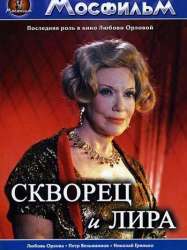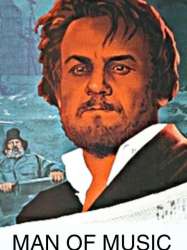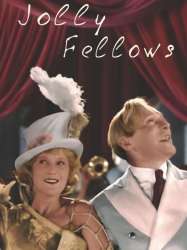Grigori Alexandrov is a Actor, Director, Scriptwriter, First Assistant Director and Editor Russe born on 22 january 1903 at Yekaterinburg (Russie)

Grigori Vasilyevich Aleksandrov or Alexandrov (Russian: Григо́рий Васи́льевич Алекса́ндров - original family name was Мормоненко or Mormonenko; 23 January 1903, Ekaterinburg – 16 December 1983, Moscow) was a prominent Soviet film director who was named a People's Artist of the USSR in 1947 and a Hero of Socialist Labor in 1973. He was awarded the Stalin Prizes for 1941 and 1950.
Initially associated with Sergei Eisenstein, with whom he worked as a co-director, screenwriter and actor, Aleksandrov became a major director in his own right in the 1930s, when he directed Jolly Fellows and a string of other musical comedies starring his wife Lyubov Orlova.
Though Aleksandrov remained active until his death, his musicals, amongst the first made in the Soviet Union, remain his most popular films. They rival Ivan Pyryev's films as the most effective and light-hearted showcase ever designed for Stalin-era USSR.
Grigori Mormonenko (il prit le nom d'Alexandrov plus tard) naquit dans une famille de mineurs de l'Oural. Il commença à travailler à l'âge de dix ans. En 1912, il devient technicien à l'opéra d'Ekaterinbourg. Plus tard, il suit les cours du conservatoire de musique de la ville en classe de violon, dont il sort diplômé en 1917.
Carrière
C'est en 1921, alors qu'il travaille au théâtre Proletcult (de la culture du prolétariat) de Moscou, qu'il rencontre Serge Eisenstein qui a vingt-trois ans. Des années de collaboration vont commencer : d'abord au théâtre et ensuite pour le cinéma muet. Alexandrov interprète le rôle de Guiliarovski dans Le cuirassé Potemkine en même temps qu'il assure le rôle d'assistant du réalisateur. Il collabore ensuite à Octobre, dix jours qui ébranlèrent le monde et à La Ligne générale.
Il traversa l'Atlantique avec lui pour rejoindre Hollywood au début des années 1930. Il se rendit aussi au Mexique pendant quinze mois pour un projet qui ne se réalisa pas mais dont il tira le film Que Viva Mexico ! en 1979 à partir des rushs tournés par Eisenstein, Tissé et Alexandrov en 1930, récupérés des archives hollywoodiennes par le Gosfilmofond russe en 1978.
Revenu en URSS en 1932, Alexandrov sous les ordres de Staline dirigea le film L'Internationale en 1933, et créa ensuite le premier film musical soviétique (après en avoir parlé à Staline et à Gorki) Joyeux Garçons en 1934, avec la participation de Lioubov Orlova et de Léonid Outiossov. Alexandrov épousera plus tard Lioubov Orlova, dont le premier mari, économiste, avait été arrêté en 1930. Elle sera son interprète principale pour des films à succès, comme Le Cirque, Volga Volga (1938), ou La Voie lumineuse.
En 1943, il prend la direction du Théâtre national d'acteur de cinéma fondé sur la décision du Conseil des commissaires du peuple.
Après la guerre, Alexandrov créa encore un nouveau film musical Le Printemps (1947) avec Lioubov Orlova, Nicolas Tcherkassov et Faïna Ranevskaïa. Plusieurs de ses intimes furent emprisonnés par Staline, mais celui-ci avait de l'admiration pour le couple Alexandrov-Orlova. Alexandrov trouva moins d'inspiration après la mort du Père des Peuples, et tourna des documentaires sur Lénine et la révolution, ainsi qu'un documentaire sur son épouse morte en 1975.
Décorations et hommages
Artiste du peuple de l'URSS : 1948
prix Staline :
1941 : pour les films Le Cirque et Volga, Volga
1950 : pour le film Rencontre sur l'Elbe
Héros du travail socialiste : 1948)
ordre de Lénine : 1939, 1950, 1973
ordre de l'Amitié des peuples : 1983
ordre du Drapeau rouge du Travail : 1953, 1963, 1967
ordre de l'Étoile rouge : 1935
En 1935 à l'occasion de l'anniversaire des quinze ans du cinéma soviétique, Alexandrov a été décoré de l'ordre de l'Étoile rouge, décoration théoriquement réservée aux seuls militaires.
Décès
Il repose à côté de sa deuxième épouse Lioubov Orlova au cimetière de Novodevitchi, à Moscou.
Source : Wikidata
Grigori Alexandrov

Birth name Grigori Vassiliévitch Mormonenko
Nationality Russie
Birth 22 january 1903 at Yekaterinburg (Russie)
Death 16 december 1983 (at 80 years) at Moscow (Russie)
Awards People's Artist of the USSR, Order of Lenin, State Stalin Prize, Order of the Red Star
Nationality Russie
Birth 22 january 1903 at Yekaterinburg (Russie)
Death 16 december 1983 (at 80 years) at Moscow (Russie)
Awards People's Artist of the USSR, Order of Lenin, State Stalin Prize, Order of the Red Star
Initially associated with Sergei Eisenstein, with whom he worked as a co-director, screenwriter and actor, Aleksandrov became a major director in his own right in the 1930s, when he directed Jolly Fellows and a string of other musical comedies starring his wife Lyubov Orlova.
Though Aleksandrov remained active until his death, his musicals, amongst the first made in the Soviet Union, remain his most popular films. They rival Ivan Pyryev's films as the most effective and light-hearted showcase ever designed for Stalin-era USSR.
Biography
EnfanceGrigori Mormonenko (il prit le nom d'Alexandrov plus tard) naquit dans une famille de mineurs de l'Oural. Il commença à travailler à l'âge de dix ans. En 1912, il devient technicien à l'opéra d'Ekaterinbourg. Plus tard, il suit les cours du conservatoire de musique de la ville en classe de violon, dont il sort diplômé en 1917.
Carrière
C'est en 1921, alors qu'il travaille au théâtre Proletcult (de la culture du prolétariat) de Moscou, qu'il rencontre Serge Eisenstein qui a vingt-trois ans. Des années de collaboration vont commencer : d'abord au théâtre et ensuite pour le cinéma muet. Alexandrov interprète le rôle de Guiliarovski dans Le cuirassé Potemkine en même temps qu'il assure le rôle d'assistant du réalisateur. Il collabore ensuite à Octobre, dix jours qui ébranlèrent le monde et à La Ligne générale.
Il traversa l'Atlantique avec lui pour rejoindre Hollywood au début des années 1930. Il se rendit aussi au Mexique pendant quinze mois pour un projet qui ne se réalisa pas mais dont il tira le film Que Viva Mexico ! en 1979 à partir des rushs tournés par Eisenstein, Tissé et Alexandrov en 1930, récupérés des archives hollywoodiennes par le Gosfilmofond russe en 1978.
Revenu en URSS en 1932, Alexandrov sous les ordres de Staline dirigea le film L'Internationale en 1933, et créa ensuite le premier film musical soviétique (après en avoir parlé à Staline et à Gorki) Joyeux Garçons en 1934, avec la participation de Lioubov Orlova et de Léonid Outiossov. Alexandrov épousera plus tard Lioubov Orlova, dont le premier mari, économiste, avait été arrêté en 1930. Elle sera son interprète principale pour des films à succès, comme Le Cirque, Volga Volga (1938), ou La Voie lumineuse.
En 1943, il prend la direction du Théâtre national d'acteur de cinéma fondé sur la décision du Conseil des commissaires du peuple.
Après la guerre, Alexandrov créa encore un nouveau film musical Le Printemps (1947) avec Lioubov Orlova, Nicolas Tcherkassov et Faïna Ranevskaïa. Plusieurs de ses intimes furent emprisonnés par Staline, mais celui-ci avait de l'admiration pour le couple Alexandrov-Orlova. Alexandrov trouva moins d'inspiration après la mort du Père des Peuples, et tourna des documentaires sur Lénine et la révolution, ainsi qu'un documentaire sur son épouse morte en 1975.
Décorations et hommages
Artiste du peuple de l'URSS : 1948
prix Staline :
1941 : pour les films Le Cirque et Volga, Volga
1950 : pour le film Rencontre sur l'Elbe
Héros du travail socialiste : 1948)
ordre de Lénine : 1939, 1950, 1973
ordre de l'Amitié des peuples : 1983
ordre du Drapeau rouge du Travail : 1953, 1963, 1967
ordre de l'Étoile rouge : 1935
En 1935 à l'occasion de l'anniversaire des quinze ans du cinéma soviétique, Alexandrov a été décoré de l'ordre de l'Étoile rouge, décoration théoriquement réservée aux seuls militaires.
Décès
Il repose à côté de sa deuxième épouse Lioubov Orlova au cimetière de Novodevitchi, à Moscou.
Usually with
Filmography of Grigori Alexandrov (17 films)
Actor

Starling and Lyre (1974)
, 2h22Directed by Grigori Alexandrov
Genres Drama, War, Thriller, Adventure, Spy, Romance
Themes Spy films
Actors Lioubov Orlova, Piotr Veliaminov, Nikolai Grinko, Rina Zelionaïa, Rimma Markova, Boris Seidenberg
Roles General (uncredited)
Rating43%






Battleship Potemkin (1926)
, 1h15Directed by Sergueï Eisenstein
Origin Russie
Genres Drama, War, Historical
Themes Seafaring films, Politique, Transport films, Political films
Actors Grigori Alexandrov, Sergueï Eisenstein, Andrei Veit
Roles Chief Officer Giliarovsky
Rating78%





The film is set in June 1905; the protagonists of the film are the members of the crew of the Potemkin, a battleship of the Imperial Russian Navy's Black Sea Fleet. Eisenstein divided the plot into five acts, each with its own title:

Strike (1925)
, 1h18Directed by Sergueï Eisenstein, Grigori Alexandrov
Origin Russie
Genres Drama
Themes Politique, Films about the labor movement, Political films
Actors Grigori Alexandrov, Anatoly Kuznetsov
Roles Factory Foreman
Rating75%





На заводе всё спокойно / At the factory all is quiet Using typography, the word "но" (but) is added to the title of the chapter which then animates and dissolves into an image of machinery in motion.

Glumov's Diary (1923)
, 5minutesDirected by Sergueï Eisenstein
Origin Russie
Genres Comedy, Fantasy
Actors Grigori Alexandrov, Sergueï Eisenstein
Roles Glumov 2, Golutvin
Rating55%





Une journée de la vie d'un certain Gloumov vue en quatre minutes.
Director

Hurray Mexico! (1979)
, 1h25Directed by Sergueï Eisenstein, Grigori Alexandrov
Origin Russie
Genres Documentary
Actors Serge Bondartchouk
Rating73%





There is no evidence that Eisenstein had any specific idea for a film about or set in Mexico before his actual arrival there in December 1930, although he began shooting almost immediately. The Sinclairs had made it clear that they were expecting Eisenstein to concentrate on visual imagery, and anything by way of a plot would be secondary: they were looking for an artistic travelogue. Furthermore, although the film was to have been completed by April 1931, it wasn't until about that time that Eisenstein even settled on the basic idea of a multi-part film, an anthology with each part focussed on a different subculture of the Mexican peoples. Only later still would this idea resolve itself into the concept of a six-part film encompassing the history of the nation, its people and its societal evolution to the present time. Specific details and the contents of each section, and how to connect them, would evolve further over the ensuing months while Eisenstein, Alexandrov and Tisse shot tens of thousands of feet of film. Toward the latter part of 1931, the film was finally structured, in Eisenstein's mind, to consist of four primary sections plus a brief prologue and epilogue.

Starling and Lyre (1974)
, 2h22Directed by Grigori Alexandrov
Genres Drama, War, Thriller, Adventure, Spy, Romance
Themes Spy films
Actors Lioubov Orlova, Piotr Veliaminov, Nikolai Grinko, Rina Zelionaïa, Rimma Markova, Boris Seidenberg
Rating43%






The Great Farewell (1953)
Directed by Grigori Alexandrov, Mikhaïl Tchiaoureli, Sergueï Guerassimov, Ilya Kopaline
Origin Russie
Themes Politique, Documentary films about historical events, Political films
Rating18%






Man of Music (1952)
Directed by Grigori Alexandrov
Origin Russie
Genres Drama, Historical, Musical
Themes Films about music and musicians, Films about classical music and musicians, Musical films
Actors Lioubov Orlova, Andrei Popov, Vladimir Saveliev, Georgy Vitsin, Iouri Lioubimov, Rina Zelionaïa
Rating64%





The young composer Mikhail Glinka performs his new work at a soiree at earl Vielgorsky's house. However, the public is accustomed to Western music, and reacts coldly to the creation of the composer. This makes him very sad, but soon he decides to go learn the art of music in Italy.

Spring (1947)
, 1h44Directed by Grigori Alexandrov
Origin Russie
Genres Comedy, Musical theatre, Musical, Romance
Actors Nikolai Cherkasov, Lioubov Orlova, Faïna Ranevskaïa, Rina Zelionaïa, Alekseï Konsovski, Georgi Yumatov
Rating71%





Voulant réaliser un film sur une scientifique célèbre, un réalisateur lui cherche un sosie qui pourrait tenir ce rôle. Il en trouve un mais celle-ci débordée entre ses différentes activités peine à tenir le rôle. L'assistant du réalisateur tente alors de convaincre la scientifique de tenir le rôle de façon incognito en se faisant passer pour le sosie.

Volga - Volga (1938)
, 1h44Directed by Grigori Alexandrov
Genres Comedy, Musical theatre, Musical
Themes Films about music and musicians, Musical films
Actors Lioubov Orlova, Igor Ilinski, Andreï Toutychkine, Valentina Kibardina, Vsevolod Sanaïev
Rating65%





Byvalov, chef carriériste et bureaucrate d'une petite ville de province rêve de s'établir à Moscou. Il reçoit un télégramme de la capitale pour présenter des équipes de musiciens amateurs aux Olympiades musicales de Moscou, mais estimant qu'il n'y a pas de talent dans sa petite ville, Byvalov ne veut envoyer personne. Il existe deux orchestres d'amateurs en ville, l'un de musique classique, l'autre de musique populaire. Ils essayent en vain de convaincre le chef du soviet municipal. Finalement Byvalov, accepte de partir en bateau sur la Volga pour rejoindre Moscou, avec l'orchestre de musique classique. L'autre équipe, dirigée par Dounia (Lioubov Orlova), s'y rend par ses propres moyens et arrive avant les autres.

Circus (1936)
, 1h34Directed by Grigori Alexandrov
Genres Comedy, Musical theatre, Musical, Melodrama
Themes Circus films, Films about music and musicians, Théâtre, Musical films, Films based on plays
Actors Lioubov Orlova
Rating65%





Orlova plays an American circus artist who, after giving birth to a black baby (played by James Lloydovich Patterson), immediately becomes a victim of racism and is forced to stay in the circus, but finds refuge, love and happiness in the USSR. Her black son is embraced by friendly Soviet people. The movie climaxes with a lullaby being sung to the baby by representatives of various Soviet ethnicities taking turns.

Jolly Fellows (1934)
, 1h36Directed by Grigori Alexandrov
Origin Russie
Genres Comedy, Musical theatre, Musical
Themes Films about music and musicians, Musical films
Actors Lioubov Orlova, Leonid Utyosov
Rating68%





Yelena (Mariya Strelkova), a well-off would-be singer who can't carry a tune, mistakes shepherd Kostya Potekhin (Leonid Utyosov) for a famous Italian conductor of a jazz orchestra and invites him to an elegant party held in her house. He plays his pan flute, which attracts the herd of animals from his kolkhoz to the dining tables. Yelena's servant Anyuta (Lyubov Orlova) falls for Kostya. But Kostya is attracted to Yelena, and when she turns him down following the discovery of his real identity, he is very upset. He leaves for the city to try himself as a professional musician and finds himself in many comical situations. Eventually he joins a jazz band consisting of young "jolly fellows". Kostya becomes a head of the band and it turns to be quite a challenge - not only is he supposed to manage the creative work and performances but he must also control his quick-tempered bandmates, whose fiery arguments sometimes turn rehearsals into a brawl that results in the band being turned out of the house by their landlord. Because of this the band is urged to rehearse before a forthcoming performance right in the street and even play at funerals for more practice. On a rainy evening Kostya and his band mates accidentally meet Anyuta on their way to a concert hall and take her with them. She is revealed to be an excellent singer, so she joins the band and they start to perform together successfully.

Sentimental Romance (1930)
, 20minutesDirected by Sergueï Eisenstein, Grigori Alexandrov
Origin France
Genres Drama, Comedy, Musical, Romance
Rating64%





The film opens with a montage of scenes of elemental violence—crashing waves and falling trees alternate with images of trees speeding past as if viewed from a motorcar. The imagery gradually changes to more tranquil vistas of clouds, grass swaying in a breeze, and rippling water. The first interior shot shows a woman silhouetted against a window. There are several shots of a fireplace and of clocks and their pendulums. The woman moves from the window to a piano, and begins singing a Russian song. Partway through her song, she is surrounded by starbursts and the dark, indoor setting of the scene is replaced by radiant clouds. Images of swans are intercut with images of Rodin sculptures. Eventually the indoor setting returns and rain is seen falling against the night sky. After an interval, the sun is shown moving through the sky, and the singer finishes her song as flowering nature reappears.

The General Line (1929)
, 2h11Directed by Sergueï Eisenstein, Grigori Alexandrov
Origin Russie
Genres Drama
Themes Films about the labor movement
Rating71%





Dans un village traditionnel, Marfa Lapkina est une pauvre paysanne qui ne possède même pas un cheval. Les koulaks, les paysans riches, refusent d'aider les plus pauvres. Marfa considère le communisme comme son seul espoir. Avec l'appui de jeunes communistes et de responsables du parti, elle lance l'idée d'une coopérative, un kolkhoze. Grâce au kolkhoze, les paysans apprennent le travail en commun et découvrent la mécanisation.
 , 1h42
, 1h42Directed by Sergueï Eisenstein, Grigori Alexandrov, Ilya Trauberg
Origin Russie
Genres Drama, Documentary, Historical
Themes Politique, Political films
Actors Vladimir Popov, Édouard Tissé, Boris Livanov
Rating73%





The film opens with the elation after the February Revolution and the establishment of the Provisional Government, depicting the throwing down of the Tsar's monument. It moves quickly to point out it's the "Same old story" of war and hunger under the new Provisional Government, however. The buildup to the October Revolution is dramatized with intertitles marking the dates of events.
 Connection
Connection



